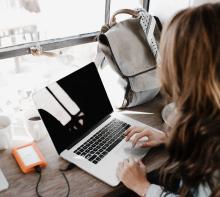Early in the pandemic, the lives of students and teachers alike were altered in previously unimaginable ways. We went into ‘lockdown,’ courses became remote, and we had to rely on Zoom to meet and hold classes. Rather than just recycling pre-pandemic material in a new format, several Sociology department instructors went beyond switching to online teaching: they transformed their courses so students could learn about and process their pandemic experience in real time.
Sociology doctoral student Erin Carll had originally planned to teach our Education Practicum in Spring 2020. This beloved practicum offers undergraduates an opportunity to tutor in the classrooms of local public schools, and to reflect on their first-hand exposure to educational disparities through readings, writing, and class discussions. With K-12 classrooms closed by state mandate, Erin transformed the course into a new, research-focused practicum experience: “Sociological Research on Education During a Health Crisis.” Barred from conducting field research in-person, students instead surveyed 195 families about their experience with distance learning during the early period of the pandemic. Some students continued working with Erin over the summer to produce a report that describes variation in how the pandemic and online learning affected students’ physical and mental health.
Professor Julie Brines reworked her SOC 459 New Inequality course, and in Spring taught “The New Inequality: Social Stratification in the Wake of COVID-19.” She refocused the class on inequalities specifically arising from, or exacerbated by, the pandemic. Topics ranged from the new recognition of “frontline workers” and the risks and consequences of their work, to how reliance on virtual technologies can increase access as well as worsen disparities by race, income, or geography. Students submitted weekly “pandemic journal” entries—short reflective essays on a weekly topic. Later in the quarter they developed their essays into a final paper, focusing on one or two themes supported by additional research.
Forecasting the what social changes the pandemic presaged was difficult, but sociologists understood these changes would entail much more than minor disruptions to daily life. Despite distance learning challenges, undergraduate students have been highly engaged in their reimagined classes. Emily Uematsu, who worked on the report on the health of K-12 students over the summer, called the education practicum “one of the most rewarding experiences” she’s had since she arrived at the University of Washington. The second undergraduate editor of the report, Yiyang (Kelly) Yu, observed that the project gave her “substantial understanding and more expectations of sociological research works I have been longing for.” Sociology gives students insight into the pandemic’s consequences for social systems and human relationships, as well as offering meaningful work in times of heightened insecurity and uncertainty. As fall quarter begins and it’s become clear that these disruptions will continue for the foreseeable future, our classes will continue to engage with how the pandemic is altering society.
